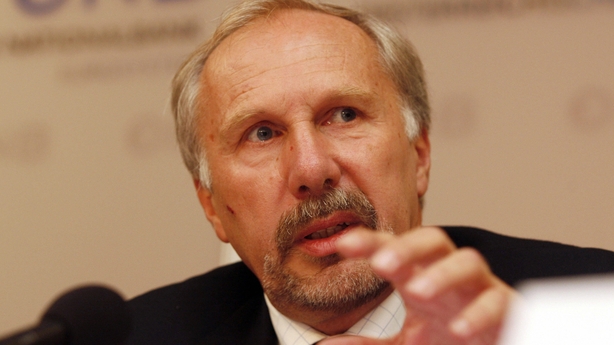The chief of the International Monetary Fund has said a Greek exit from the eurozone is a possibility, but would not signify an end to the single currency.
In a newspaper interview, IMF chief Christine Lagarde said such a scenario would not be a "walk in the park" for the single currency, but would "probably not be an end to the euro".
Inhe interview, which was carried in German daily Frankfurter Allgemeine Zeitung, Ms Lagarde rejected Athens' assertion that a deal with its creditors was imminent.
"It is very unlikely that we'll reach a comprehensive solution in the coming days," she said.
After positive signals had come from Greece 10 days ago, "we've been sobered again in the last week," Ms Lagarde said.
There was still a lot of work to be done, she said, and the IMF was not prepared to pay out more funds without a clear reform pledge.
"We have rules. We have principles. There will be no half-baked programme review," Lagarde said.
Earlier today, European Central Bank policymakers played down the prospects of any immediate loosening of funding for cash-strapped Greece.
They said that when it came to accepting Greek bonds as security for central bank credit, the answer remained 'no'.
The ECB's vice president underlined the seriousness of the situation facing Greece, talking openly about a possible default, which would be the first of its kind in the 16-year-old currency bloc.
"Only when the final review of the programme will be completed and successful we, the Governing Council, can consider changing that. But not before," Vitor Constancio said.
His remarks echoed those made earlier by Ewald Nowotny, who as head of the Austrian central bank also sits on the ECB's policy-setting Governing Council.
Both counter the optimism of the Greek government that a deal is near.
"There is always a lot of noise in such a situation and I think the important point is to distinguish the noise from the facts," Nowotny said.
"For us, it is quite clear that we have certain conditions to be met. The one condition is ... whether we can accept for instance Greek assets, Greek bonds, as collateral. The answer is, for the time being: No," said 
In February, the European Central Bank abruptly cancelled its acceptance of Greek bonds in return for funding, shifting the burden onto Athens' central bank to finance its lenders and isolating Greece unless it strikes a new reform deal.
The move, which means the Greek central bank provides banks with tens of billions of euros of emergency liquidity, was in response to what many in Frankfurt saw as the Greek government's abandoning of its aid-for-reform programme.
Constancio signalled that while Greece would not leave the euro, it could default.
"The end result is that a Greek exit will not happen," he said, adding: "That's not to exclude several things that are not nice that may happen."
Commenting on the state of Greece's banks in the event of default, he said: "They can sustain the impact of a big potential impairment in Greek public debt."
He signalled that the ECB may also take a lenient view if this were to happen, a hint that they could still qualify for the emergency central bank funding that is keeping them afloat. This requires them to be solvent.
IMF will cut off Greece if payment missed
Greece will be cut off from additional IMF financing if it misses a loan payment to the crisis lender, an IMF spokesman has said.
"Any country that doesn't meet its commitment with the Fund... is declared in arrears and they have no access to IMF funding," IMF spokesman William Murray said.
But Murray said the IMF believed that Athens would not miss any of the looming payments.
"As we stand here right now, we expect the Greek authorities will pay us," Murray said at a regularly scheduled news conference.
Greece's interior minister, Nikos Voutsis, said Sunday that heavily indebted Greece had "no money" to make a series of repayments to the IMF that are due beginning June 5, totaling €1.6bn.
But Greek officials negotiating to unlock some €7.2bn in bailout cash with creditors have not suggested that a payment would be missed.
The IMF spokesman also said that the Greek government had not asked the the Fund to regroup the payments to give the country a little more time to make them. "There's been no request for a bundling," he said.

